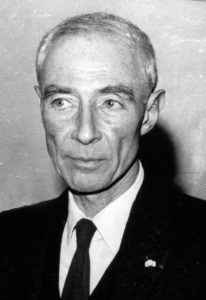
One of the greatest controversies concerning Cold War internal security measures is the case of Dr. J. Robert Oppenheimer. One of the greatest nuclear physicists of the 20th Century, Oppenheimer was one of the leading scientists involved in the Manhattan Project that created the atomic bomb during World War II. After the war, he remained a key figure in U.S. nuclear research. However, by the early 1950s, suspicions concerning Oppenheimer’s past involvement with the communist party (CPUSA), as well as disagreements with some of his positions on future development of nuclear weapons, led many both within and outside the U.S. government to consider Oppenheimer a security risk.
In December 1953, the U.S. Atomic Energy Commission suspended Oppenheimer’s security clearance, thus preventing him from engaging in nuclear research. In April-May 1954, the commission convened a three member personnel security board, which held a series of closed-door hearings to consider the case against Oppenheimer. At the conclusion of the hearings, the board voted two-to-one to permanently remove Oppenheimer’s clearance. In the words of Department of Energy (DOE) historian Terry Fehner, “The board found Oppenheimer loyal and discreet but nevertheless a security risk.” On June 28, the Atomic Energy Commission voted four-to-one to confirm the board’s recommendation and permanently revoke Robert Oppenheimer’s security clearance.
The Oppenheimer case has been a source of great controversy ever since. Almost all historians agree that Oppenheimer had nothing to do with Soviet espionage against the Manhattan Project. Divisions remain, however, on the extent of his involvement with the CPUSA. It is commonly accepted that both Oppenheimer’s wife, and his brother Frank, were CPUSA members. Whether Robert Oppenheimer himself was a party member is still disputed. Many Oppenheimer biographers, such as Kai Bird and Martin J. Sherwin, maintain that he was merely a “fellow traveler” who supported the party and shared many of its causes. John Earl Haynes and Harvey Klehr, however, argue that Oppenheimer was indeed a CPUSA member from 1939-1942, but that he left the party and abandoned communism upon joining the Manhattan Project in 1942.
In June 1954, the Atomic Energy Commission published an unclassified, one volume transcript of the Oppenheimer personnel security board hearings. The rest of the hearings remained classified until very recently. However, in October 2014, the Department of Energy finally published the entire transcript of the hearings, in 19 volumes made available on the DOE website. In an October 11 overview of the newly released transcripts, the New York Times cited the verdict of scholars that the new Oppenheimer material “offers no damning evidence against him, and that the testimony that has been kept secret all these years tends to exonerate him.”
The Oppenheimer Hearing Documents:
U.S. Atomic Energy Commission. In the matter of J. Robert Oppenheimer: Texts of Principal Documents and Letters of Personnel Security Board, General Manager, Commissioners, Washington, D.C. May 27, 1954 through June 29, 1954 . Washington, D.C.: Government Printing Office: 1954. (Joyner Hoover: QC16.O62 U52)
U.S. Atomic Energy Commission. In the matter of J. Robert Oppenheimer: Transcript of Hearing Before Personnel Security Board, Washington D.C., April 12, 1954, through May 6, 1954. Washington, D.C.: Government Printing Office: 1954. (Joyner Docs. CWIS Y 3.AT 7:2 0P 5; also available in Joyner Hoover: QC16.O62 U5 1954)
U.S. Atomic Energy Commission. “J. Robert Oppenheimer Personnel Hearings Transcripts.” U.S. Department of Energy, 2014.
Other CWIS Documents Related to J. Robert Oppenheimer:
Hearings Regarding Communist Infiltration of Radiation Laboratory and Atomic Bomb Project at the University of California, Berkeley, Calif – Vol. I (Including Foreward). Hearings Before the Committee on Un-American Activities, House of Representatives, Eighty-First Congress, First Session. 1949. (Joyner Docs CWIS: Y 4. Un 1/2: C 73/9/V. 1; also available in Joyner Hoover: HD9698.U52 A5 1949AG V. 1)
Hearings Regarding Communist Infiltration of Radiation Laboratory and Atomic Bomb Project at the University of California, Berkeley, Calif – Vol. II (Identification of Scientist X). Hearings Before the Committee on Un-American Activities, House of Representatives, Eighty-First Congress, First Session. 1949. (Joyner Docs CWIS: Y 4. Un 1/2: C 73/9/V. 2; also available in Joyner Hoover HD9698.U52 A5 1949AG V. 2)
Hearings Regarding Communist Infiltration of Radiation Laboratory and Atomic Bomb Project at the University of California, Berkeley, Calif – Volume Three. Hearings Before the Committee on Un-American Activities, House of Representatives, Eighty-First Congress, Second Session. 1950. (Joyner Docs CWIS: Y 4. Un 1/2: C 73/9/V. 3)
Testimony of Dr. Edward U. Condon. Hearing Before the Committee on Un-American Activities, House of Representatives, Eighty-Second Congress, Second Session. 1952. (Joyner Docs CWIS: Y 4.UN 1/2:C 75; circulating copy in Joyner Docs Stacks: Y 4. Un 1/2: C 75)
Related Readings:
Bird, Kai and Martin J. Sherwin. American Prometheus: The Triumph and Tragedy of J. Robert Oppenheimer. New York: Alfred A. Knopf, 2005. (Joyner Stacks: QC16.O62 B57 2005)
Broad, William J. ‘Transcripts Kept Secret for 60 Years Bolster Defense of Oppenheimer’s Loyalty.” New York Times, October 11, 2014.
Fehner, Terry. ‘Unlocking the Mysteries of the J. Robert Oppenheimer Transcript.‘ U.S. Department of Energy, October 3, 2014.
Haynes, John Earl and Harvey Klehr. ‘J. Robert Oppenheimer: A Spy? No. But a Communist Once? Yes.‘ Washington Decoded, February 11, 2012.
Haynes, John Earl, Harvey Klehr and Alexander Vassiliev. Spies: The Rise and Fall of the KGB in America. New Haven: Yale University Press, 2009. (Joyner Stacks: UB271.R9 H389 2009)
Pais, Abraham and Robert P. Crease. J. Robert Oppenheimer: A Life. New York: Oxford University Press, 2006. (Joyner Stacks: QC16.O62 P35 2006)
Thorpe, Charles. Oppenheimer: The Tragic Intellect. Chicago: University of Chicago Press, 2006. (Joyner Stacks: QC16 O62 T56 2006)